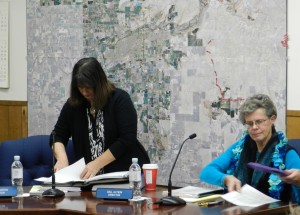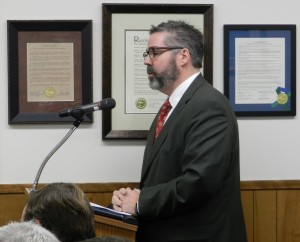
Tuesday’s meeting of the Oakdale Irrigation District’s Board of Directors was only predictable until attorney Howard Wilkins strode to the public speaker’s podium. Prior to that, the presence of new directors Gail Altieri and Linda Santos had already resulted in several 3 to 2 votes on issues ranging from staff salary increases to appropriate recognition for outgoing board members Al Bairos and Frank Clark.
No one was surprised at the split votes. Altieri and Santos ran against past board practice, which almost always was supported by unanimous votes by incumbent board members.
Wilkins’ presence shook things up. He introduced himself as a partner in the law firm Remy, Moose, and Manley and added that his firm writes the book on the California Environmental Quality Act (CEQA). Wilkins said he was representing Oakdale farmer Louis Brichetto, a longtime opponent of OID’s practice of selling water to buyers outside the district.
Wilkins advised the board members that any hasty decisions regarding implementation of the On-Farm Conservation Program, an agenda item, could be a violation of both CEQA and the Brown Act. He went on to stress the importance of allowing public comment before implementing any district project.
Most likely, Wilkins was present to provide the board with notice that henceforward its action would be under legal scrutiny by the most prominent CEQA law firm in the west. Earlier this year, Wilkins’ firm quashed a proposed OID water sale when it argued OID had not followed CEQA protocols.
A subsequent one-time sale has been challenged by rice farmer Bob Frobose as a violation of the Brown Act, and Frobose implied Tuesday he thinks OID may have also violated the Brown Act when it annexed Trinitas Partners into the district.
Wilkins gave a short lesson on fundamental requirements of CEQA and stressed that when those requirements are not met, ensuing litigation can become very expensive. Linda Santos had argued during her campaign that OID spends too much money on litigation when it should be more willing to settle disagreements with discussion and compromise.

Prior to Wilkins’ appearance at the podium, Santos asked a series of probing questions about other district expenses, especially those involving purchases from Rubicon, an Australian company specializing in equipment for water districts. Santos wanted to know whether the Rubicon purchases had been subject to competitive bidding and did not seem satisfied with General Manager Steve Knell’s rambling answers.
Frobose admonished incumbent board members that continuing past practices would amount to ignoring “a mandate” from district voters, who elected Altieri and Santos by huge margins. Both Bairos and Clark failed to receive even forty percent of the total vote in their contests against Altieri and Santos.
A major problem for OID is its dependence on out-of-district water sales for revenue. Like the Modesto Irrigation District, OID charges less for water to farmers than costs for operations and maintenance—without water sales, the district runs multi-million dollar deficits.
But OID may have to change past practices sooner than later. Today’s water realities, including the state’s new policies on maintaining sustainable groundwater use, are forcing water districts everywhere to review and rethink water use in general.
For OID, which enjoyed years of absence from media and legal scrutiny, the presence of a prominent CEQA attorney and two new board members presents a dilemma: Continue past practices and endure heightened scrutiny and increasingly costly litigation or find a way to pay its bills without selling water out of the district. Incumbent board members, like Bairos and Clark, may find that living in the past can result in severe penalties at the polls.
